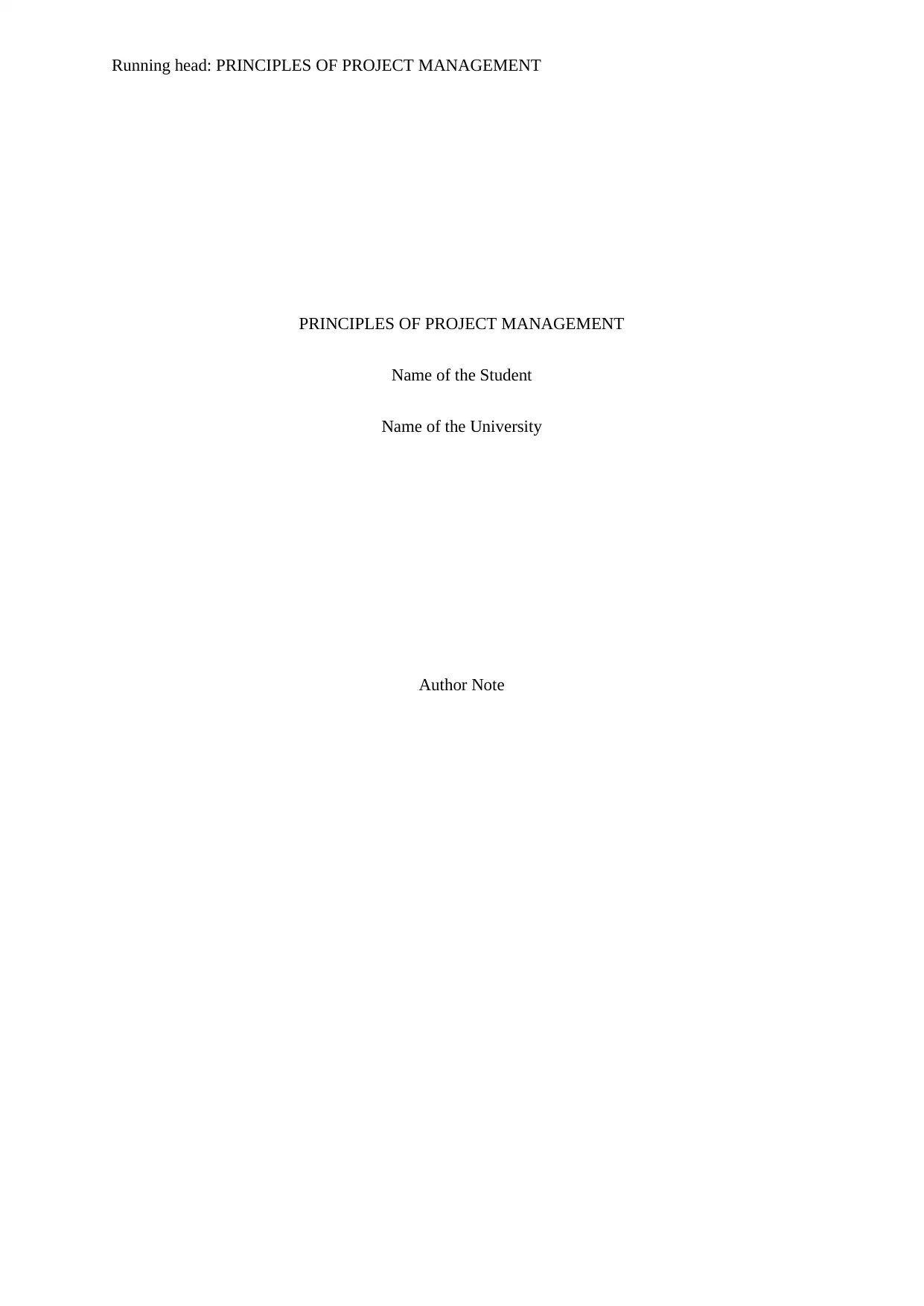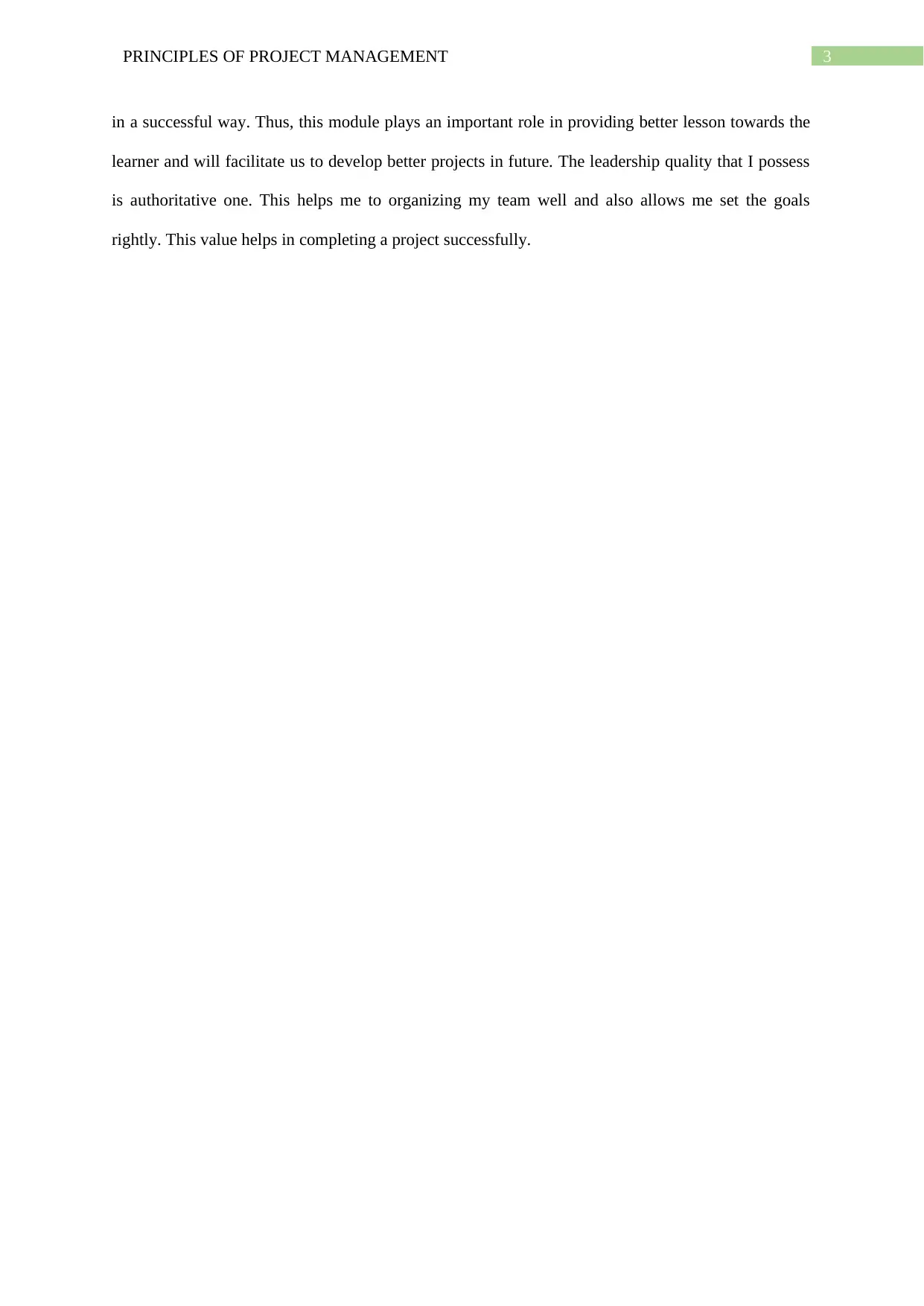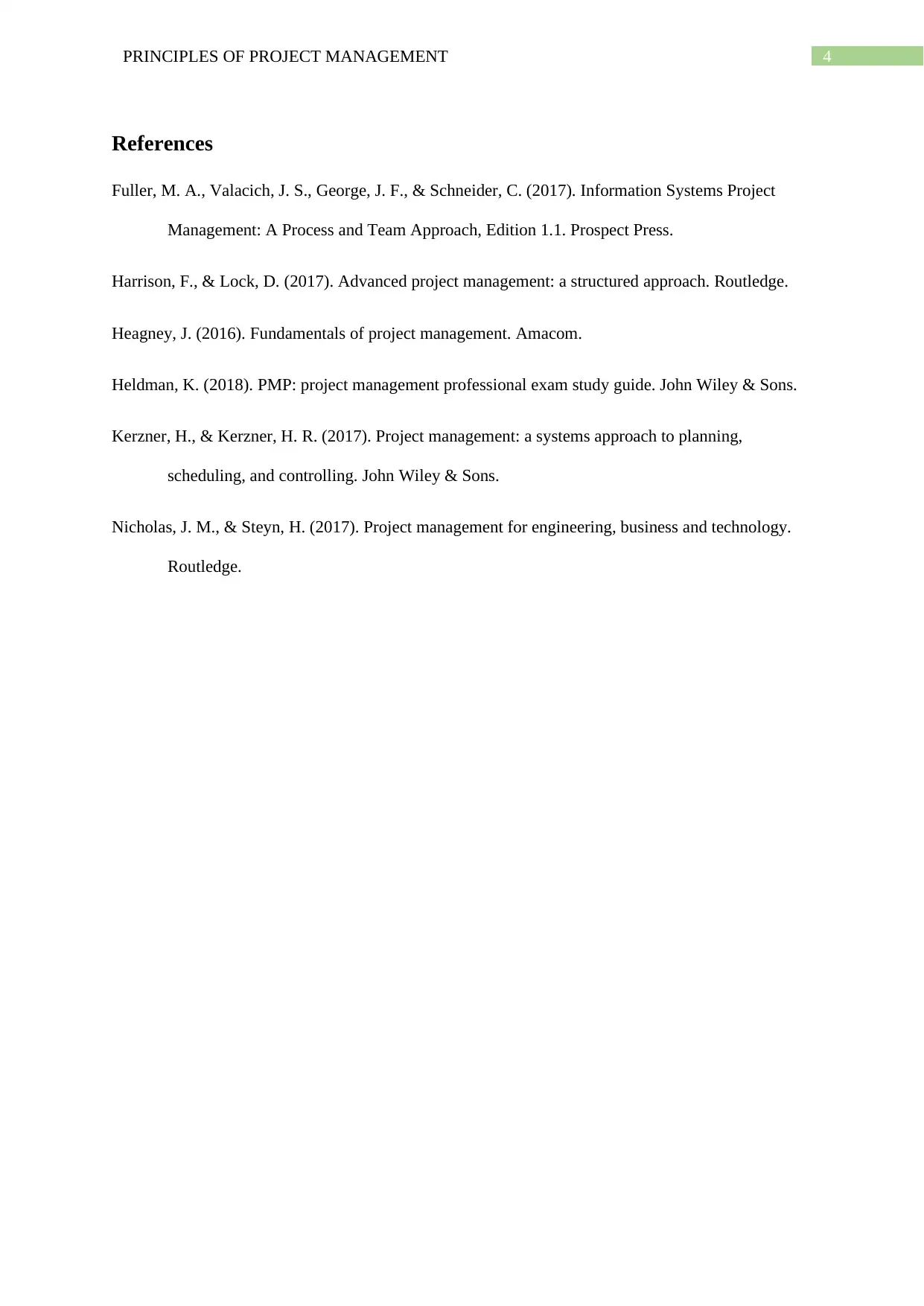Project Management: The Significance of Project Closure Phase
VerifiedAdded on 2023/05/30
|5
|1117
|475
Essay
AI Summary
This essay delves into the principles of project management, emphasizing the critical role of project closure. It highlights the 47 project management processes grouped into five phases: initiating, planning, executing, monitoring and controlling, and closing. The essay underscores the importance of clear requirements, stakeholder communication, and balancing project constraints like scope, quality, and schedule. It critically analyzes the benefits of project closure, including ensuring project completion, stakeholder approval, and formal recognition. Furthermore, the essay discusses how lessons learned from project closure can improve future projects and prevent unfavorable conditions. It also touches upon different leadership styles and the author's strengths as a team leader, advocating for an authoritative leadership approach to motivate team members and achieve project goals. The essay concludes by reinforcing the value of project closure in ensuring successful project outcomes and organizational improvement. Desklib provides access to similar solved assignments for students.

Running head: PRINCIPLES OF PROJECT MANAGEMENT
PRINCIPLES OF PROJECT MANAGEMENT
Name of the Student
Name of the University
Author Note
PRINCIPLES OF PROJECT MANAGEMENT
Name of the Student
Name of the University
Author Note
Paraphrase This Document
Need a fresh take? Get an instant paraphrase of this document with our AI Paraphraser

1PRINCIPLES OF PROJECT MANAGEMENT
Project management is the way managing and performing several applications on project with
the use of skills, tools, knowledge and techniques. This helps the project to meet the requirements.
There are total 47 logically grouped project management process that are needed to implement in
order to successfully complete a project management. This 47 processes are further divided into five
process groups (Nicholas & Steyn, 2017). This includes:
Initiating
Planning
Executing
Monitoring and Controlling
Closing
This becomes very much essential to understand and manage some features of project. This
includes understanding and identifying the requirements clearly, the needs associated with the project
are needed to be addressed, concerns and expectations of stakeholders associated with planning and
executing the project, proper communication is needed to build between the stakeholders in order to
perform the project in an effective way. Apart from all these requirements balancing the project
constraints are also necessary. This includes scope of the project, quality of the project, and schedule
of the project. The project management subject has helped me to understand the importance of proper
planning very well. In the module 6, closing project is being described (Fuller et al., 2017). This phase
includes finalising all the activities taking place within the process. Project closure is basically the last
phase of project management process and ensures that the project is completed successfully. This
provides a brief description and gives a clear overview about the legal, financial and administrative
closure necessary for project management.
The benefit of including project closure activity is that it becomes an asset process. This will
help to provide an efficient way of providing a cost, time and quality for future projects (Kerzner &
Kerzner, 2017). This module is developed to critically analyse the need of closing a project and the
benefits that are likely to be gained by the stakeholders from a project closure point of view. The
closing project helps in providing an assurance towards the project completion. This also assures that
Project management is the way managing and performing several applications on project with
the use of skills, tools, knowledge and techniques. This helps the project to meet the requirements.
There are total 47 logically grouped project management process that are needed to implement in
order to successfully complete a project management. This 47 processes are further divided into five
process groups (Nicholas & Steyn, 2017). This includes:
Initiating
Planning
Executing
Monitoring and Controlling
Closing
This becomes very much essential to understand and manage some features of project. This
includes understanding and identifying the requirements clearly, the needs associated with the project
are needed to be addressed, concerns and expectations of stakeholders associated with planning and
executing the project, proper communication is needed to build between the stakeholders in order to
perform the project in an effective way. Apart from all these requirements balancing the project
constraints are also necessary. This includes scope of the project, quality of the project, and schedule
of the project. The project management subject has helped me to understand the importance of proper
planning very well. In the module 6, closing project is being described (Fuller et al., 2017). This phase
includes finalising all the activities taking place within the process. Project closure is basically the last
phase of project management process and ensures that the project is completed successfully. This
provides a brief description and gives a clear overview about the legal, financial and administrative
closure necessary for project management.
The benefit of including project closure activity is that it becomes an asset process. This will
help to provide an efficient way of providing a cost, time and quality for future projects (Kerzner &
Kerzner, 2017). This module is developed to critically analyse the need of closing a project and the
benefits that are likely to be gained by the stakeholders from a project closure point of view. The
closing project helps in providing an assurance towards the project completion. This also assures that

2PRINCIPLES OF PROJECT MANAGEMENT
the project management process performed is being successfully accepted and approved by the
stakeholders associated with this project. Finally this includes a formal recognition on the project. The
lesson learnt from closure of the project will help in performing the closure better. This will help the
stakeholders and everyone associated with the project to understand the project well and will also be
beneficial for future projects. Project closing is important as it helps to avoid unfavourable conditions.
The lessons learned from this module is that it will help in establishing a consensus that states the
work is done in an effective manner and completed successfully. This will help in improving the work
for future projects (Harrison & Lock, 2017). In case if someone fails to implement a successful
project closure, this can leave the organization with huge problem. The stakeholders associated with
the project will be liable to pay more and more money as this will be difficult to analyse the end of the
project. The main challenge is that the project members need to understand and sort things
accordingly so that the project members can set a deadline. This is the responsibility of the team
leader to deliver the project within the time else the project will become a never ending project. The
closure will help the process to end within a stipulated time period. The subject has helped in a great
way. This helped to understand the importance of project closure and will help in completing the
project successfully. As a tea leader I possesses some strength as well as weakness. The main strength
is I am having a good communication skill and these helps in managing and organizing the team
members well. Moreover, I am having an influential attitude this helps me to convince employee to
work in a better way. This quality will help in completing every project successfully.
There are different leadership style that can be followed by project manager, this are as
follows Coercive, Authoritative, affiliative, democratic, pacesetting. This styles will help the project
manager to lead the project in a different way. In order to organize a project in a crisis situation
Coercive style of leaders will be beneficial. This style will help in managing a project from a looming
and dangerous situation. According to me it will be beneficial for me to follow authoritative way of
leadership as this will provide a better results from a project team perspective (Heagney, 2016). This
will also help to create a positive impact on the organization. An authoritative leader has the vision to
motivate their team members and sets their goal right. This will be beneficial for performing a project
the project management process performed is being successfully accepted and approved by the
stakeholders associated with this project. Finally this includes a formal recognition on the project. The
lesson learnt from closure of the project will help in performing the closure better. This will help the
stakeholders and everyone associated with the project to understand the project well and will also be
beneficial for future projects. Project closing is important as it helps to avoid unfavourable conditions.
The lessons learned from this module is that it will help in establishing a consensus that states the
work is done in an effective manner and completed successfully. This will help in improving the work
for future projects (Harrison & Lock, 2017). In case if someone fails to implement a successful
project closure, this can leave the organization with huge problem. The stakeholders associated with
the project will be liable to pay more and more money as this will be difficult to analyse the end of the
project. The main challenge is that the project members need to understand and sort things
accordingly so that the project members can set a deadline. This is the responsibility of the team
leader to deliver the project within the time else the project will become a never ending project. The
closure will help the process to end within a stipulated time period. The subject has helped in a great
way. This helped to understand the importance of project closure and will help in completing the
project successfully. As a tea leader I possesses some strength as well as weakness. The main strength
is I am having a good communication skill and these helps in managing and organizing the team
members well. Moreover, I am having an influential attitude this helps me to convince employee to
work in a better way. This quality will help in completing every project successfully.
There are different leadership style that can be followed by project manager, this are as
follows Coercive, Authoritative, affiliative, democratic, pacesetting. This styles will help the project
manager to lead the project in a different way. In order to organize a project in a crisis situation
Coercive style of leaders will be beneficial. This style will help in managing a project from a looming
and dangerous situation. According to me it will be beneficial for me to follow authoritative way of
leadership as this will provide a better results from a project team perspective (Heagney, 2016). This
will also help to create a positive impact on the organization. An authoritative leader has the vision to
motivate their team members and sets their goal right. This will be beneficial for performing a project
⊘ This is a preview!⊘
Do you want full access?
Subscribe today to unlock all pages.

Trusted by 1+ million students worldwide

3PRINCIPLES OF PROJECT MANAGEMENT
in a successful way. Thus, this module plays an important role in providing better lesson towards the
learner and will facilitate us to develop better projects in future. The leadership quality that I possess
is authoritative one. This helps me to organizing my team well and also allows me set the goals
rightly. This value helps in completing a project successfully.
in a successful way. Thus, this module plays an important role in providing better lesson towards the
learner and will facilitate us to develop better projects in future. The leadership quality that I possess
is authoritative one. This helps me to organizing my team well and also allows me set the goals
rightly. This value helps in completing a project successfully.
Paraphrase This Document
Need a fresh take? Get an instant paraphrase of this document with our AI Paraphraser

4PRINCIPLES OF PROJECT MANAGEMENT
References
Fuller, M. A., Valacich, J. S., George, J. F., & Schneider, C. (2017). Information Systems Project
Management: A Process and Team Approach, Edition 1.1. Prospect Press.
Harrison, F., & Lock, D. (2017). Advanced project management: a structured approach. Routledge.
Heagney, J. (2016). Fundamentals of project management. Amacom.
Heldman, K. (2018). PMP: project management professional exam study guide. John Wiley & Sons.
Kerzner, H., & Kerzner, H. R. (2017). Project management: a systems approach to planning,
scheduling, and controlling. John Wiley & Sons.
Nicholas, J. M., & Steyn, H. (2017). Project management for engineering, business and technology.
Routledge.
References
Fuller, M. A., Valacich, J. S., George, J. F., & Schneider, C. (2017). Information Systems Project
Management: A Process and Team Approach, Edition 1.1. Prospect Press.
Harrison, F., & Lock, D. (2017). Advanced project management: a structured approach. Routledge.
Heagney, J. (2016). Fundamentals of project management. Amacom.
Heldman, K. (2018). PMP: project management professional exam study guide. John Wiley & Sons.
Kerzner, H., & Kerzner, H. R. (2017). Project management: a systems approach to planning,
scheduling, and controlling. John Wiley & Sons.
Nicholas, J. M., & Steyn, H. (2017). Project management for engineering, business and technology.
Routledge.
1 out of 5
Related Documents
Your All-in-One AI-Powered Toolkit for Academic Success.
+13062052269
info@desklib.com
Available 24*7 on WhatsApp / Email
![[object Object]](/_next/static/media/star-bottom.7253800d.svg)
Unlock your academic potential
Copyright © 2020–2026 A2Z Services. All Rights Reserved. Developed and managed by ZUCOL.





